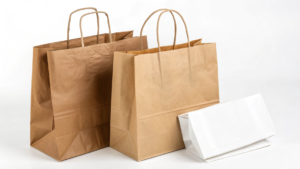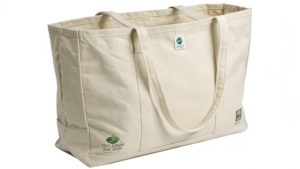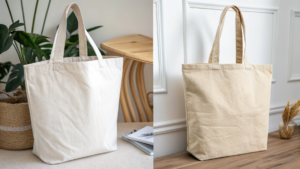Why do people pick plastic bags over paper ones?
On the surface, it’s easy to assume that people pick plastic bags over paper ones purely out of habit or convenience. But the deeper truth is: the choice between plastic and paper is rarely just about function—it’s a reflection of how we weigh short-term ease against long-term responsibility.
People often choose plastic bags over paper ones due to their immediate convenience, durability, waterproof nature, lower cost, and compact size. This choice reflects a prioritization of short-term ease and efficiency in everyday situations.
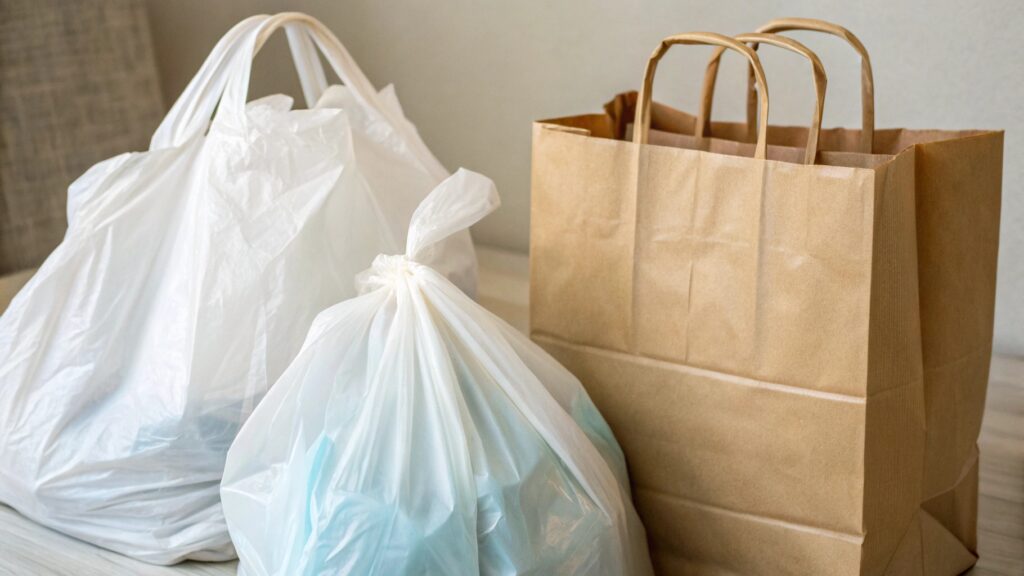
Plastic bags are lightweight, waterproof, compact, and often free. In fast-paced environments like supermarkets or takeout counters, they simply work. Speed and efficiency drive consumer behavior, and plastic delivers both with minimal friction. But that’s only part of the story. What most discussions miss is the psychological dimension: plastic bags offer a kind of emotional insulation from responsibility. They’re disposable, forgettable, and deceptively convenient. Unlike paper bags, which are bulkier and often perceived as "eco-conscious," plastic bags allow users to postpone the guilt of waste—out of sight, out of mind.
Why plastic bags are better than paper?
It seems counterintuitive to call plastic "better," especially with all the environmental concerns. But from a functional and cost perspective, they offer clear advantages.
From a utilitarian standpoint, plastic bags are often considered "better" than paper because they are lighter, more durable, waterproof, cheaper to produce and transport, and take up less storage space for both retailers and consumers.
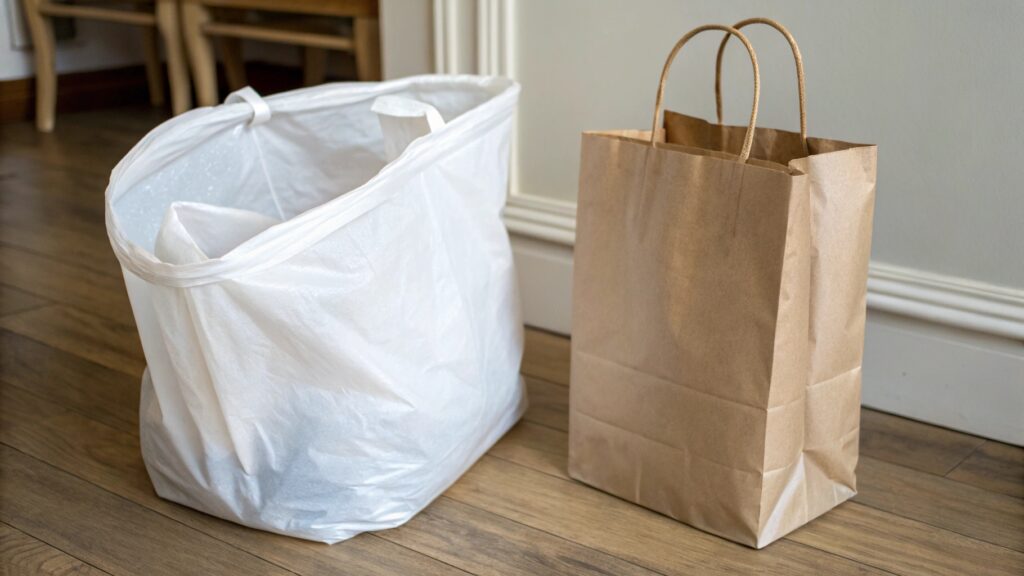
Plastic bags excel in many practical aspects that influence daily choices. They are incredibly lightweight, making them easy to carry. This is a big plus when you are carrying multiple items. I have often seen shoppers struggling with heavy paper bags that feel like they are about to tear. Plastic bags are also waterproof. This is a huge advantage in places like Singapore, where unexpected rain showers are common. Imagine walking out of a store with a paper bag only for it to get soaked and break, spilling your groceries. Plastic bags prevent this kind of frustrating experience. They are also very compact when empty, taking up little space in a drawer or a pocket. From a business perspective, plastic bags1 are significantly cheaper to produce than paper bags. They also take up less space in storage and during shipping. This means lower costs for retailers. For small businesses especially, every cent saved on operational costs matters. This economic reality plays a big role in why plastic remains so popular. Even though we hear about environmental impacts2, the immediate benefits of plastic bags are hard to ignore for many people and businesses.
Here is a comparison of common features:
| Feature | Plastic Bags | Paper Bags |
|---|---|---|
| Weight | Very light | Heavier |
| Durability | High (resists tearing) | Lower (can tear easily) |
| Water Resistance | Excellent | Poor (absorbs water) |
| Cost | Lower production, lower shipping | Higher production, higher shipping |
| Storage Space | Very compact when empty | Bulky when empty |
| Reusability | Can be reused for trash or other purposes | Can be reused for light items, often degrades |
Are plastic bags better for the environment?
This is a tricky question, and the answer is not as simple as it seems. Most people assume paper is always greener, but that is not the full picture.
No, plastic bags are generally not better for the environment due to their persistent pollution, especially in marine ecosystems, and their reliance on fossil fuels for production; however, paper bags also have significant environmental impacts related to production energy and deforestation.
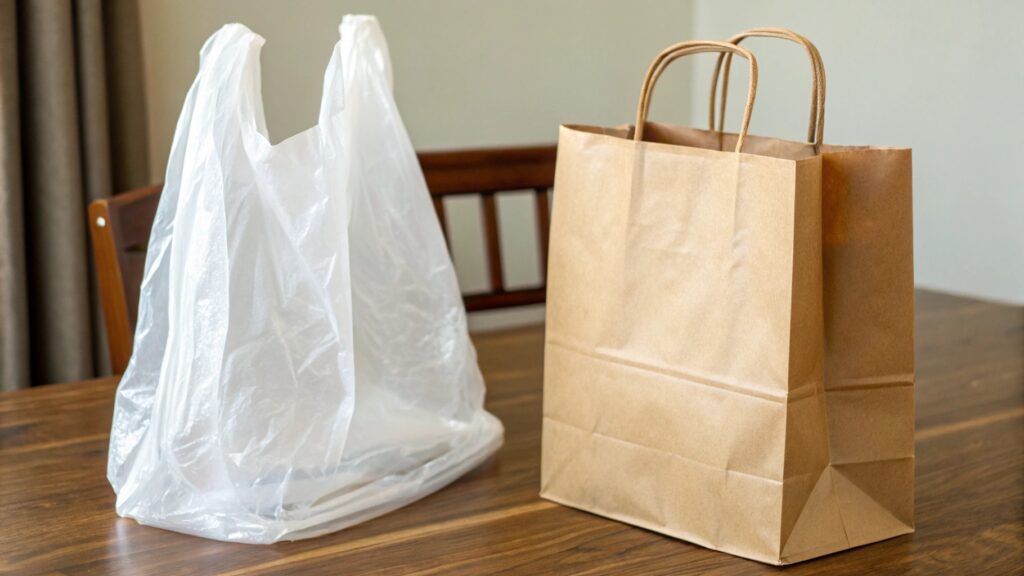
Here’s where it gets interesting: even environmentally aware consumers still choose plastic when faced with inconvenience, rain, or unexpected purchases. This reveals a kind of cognitive dissonance—we know plastic is harmful, but we rationalize its use in the moment as “just this once.” Unfortunately, “just once” becomes habitual. While plastic bags are infamous for littering our oceans and taking hundreds of years to break down, their production actually requires less energy and water compared to paper bags. Paper bags, though biodegradable, are heavier and bulkier. This means they require more fuel to transport, leading to higher carbon emissions in logistics. Producing paper bags also uses more trees and water, and the manufacturing process can lead to more air pollution. I have learned that evaluating environmental impact is complex. It involves looking at the entire lifecycle of a product, from raw material extraction to disposal. It is not just about what happens after you throw it away. We have to consider the resources used to make it in the first place. The paradox is that while paper breaks down faster, its initial carbon footprint can be larger.
Let me break down the environmental impacts:
| Environmental Factor | Plastic Bags | Paper Bags |
|---|---|---|
| Raw Materials | Fossil fuels (petroleum) | Trees (deforestation concern) |
| Energy for Production | Lower | Higher |
| Water Usage | Lower | Higher |
| Air Pollution (Mfg.) | Lower | Higher |
| Greenhouse Gas (Mfg.) | Lower | Higher (though transportation adds to plastic's) |
| Waste Volume | Less in landfills due to compaction | More in landfills due to bulk |
| Biodegradability | Very slow (hundreds of years) | Faster (weeks to months) |
| Marine Pollution | Significant (persistent microplastics) | Less (biodegrades, but still initial impact) |
| Transportation | Lower emissions (lighter, compact) | Higher emissions (heavier, bulkier) |
This complex picture shows why simple solutions are hard to find.
What will happen if we stop using plastic bags?
Stopping the use of plastic bags seems like a straightforward step towards a greener future. But what would truly happen if we made this switch?
If we completely stop using plastic bags, there would be a significant reduction in plastic pollution, especially in oceans and landfills. However, it would likely lead to an increased demand for paper bags or reusable bags3, potentially shifting environmental burdens to different areas like higher energy consumption or increased textile waste.
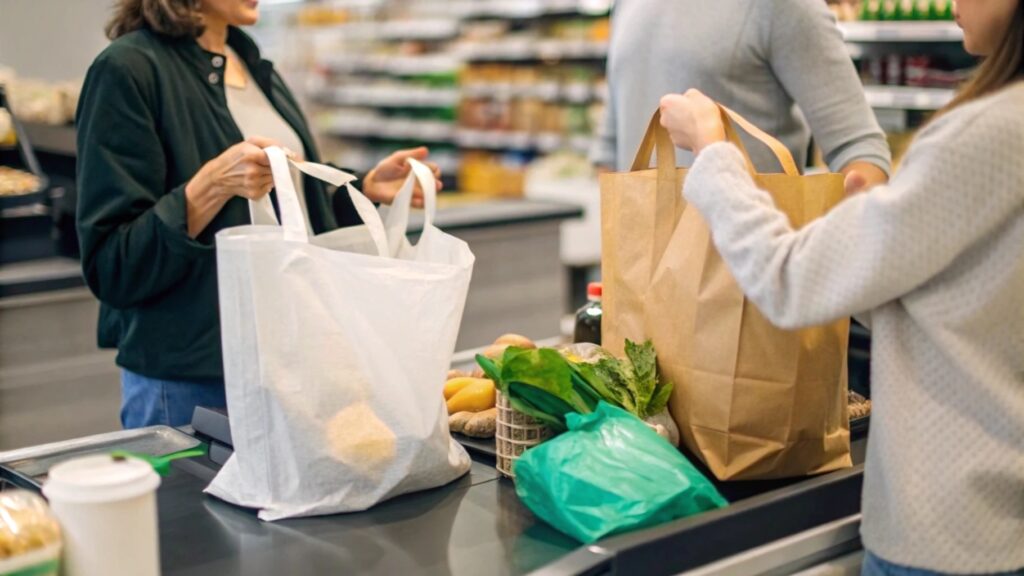
The immediate impact of stopping plastic bag use would be visible. We would see less plastic litter on streets, in parks, and in our waterways. This is a clear positive. Less plastic means less harm to wildlife that can get tangled in or ingest plastic debris. Landfills would also see a decrease in plastic waste volume, though plastic bags are relatively compact. However, this change is not without its own set of challenges. My experience with supply chains shows me that this would lead to a surge in demand for alternatives. If everyone switches to paper bags, this means more trees would need to be harvested. It also means more energy would be used in manufacturing and transporting those heavier paper bags. Another outcome could be a greater reliance on reusable bags. While reusable bags are good, they also have an environmental footprint, especially if they are not used many times. For example, a cotton tote bag needs to be reused hundreds of times to have a lower environmental impact than a single-use plastic bag. People might also forget their reusable bags, leading to them buying new ones, which creates more waste. Ultimately, stopping plastic bags alone does not solve the underlying problem of consumption and waste. It just shifts it.
Here are some potential outcomes:
| Area of Impact | Positive Changes | Potential Negative Changes |
|---|---|---|
| Plastic Pollution | Significant reduction in litter, especially marine and terrestrial. | Increased demand for alternative materials (paper, reusable). |
| Wildlife | Less entanglement and ingestion by animals. | Shift in waste burden to other materials. |
| Landfills | Reduced plastic volume, though plastic bags are compact. | Increased bulkier waste if paper replaces plastic. |
| Resource Use | Less reliance on fossil fuels for bag production. | Increased tree harvesting for paper. |
| Energy Consumption | Reduced energy for plastic bag production. | Increased energy for paper bag production and transport. |
| Consumer Behavior | Encourages mindfulness about waste. | Potential for increased buying of new reusable bags if forgotten. |
| Retailer Costs | Potential increase in costs for alternative bags. | Need for businesses to adapt supply chains. |
| Innovation | Drives development of truly sustainable alternatives. | No immediate, perfect replacement for plastic's utility. |
So, why do people choose plastic bags? Because the system makes it easier. Because behavior change is hard. Because in a moment of decision, immediacy often outweighs ideology. Until governments regulate, retailers incentivize, and consumers are offered more functional, cost-effective alternatives, plastic will continue to dominate—not because it’s better, but because it fits the current system better.
Conclusion
People favor plastic bags for convenience, cost, and durability, despite environmental concerns. Stopping plastic bag use reduces plastic pollution but shifts burdens to paper or reusable alternatives, highlighting the complex nature of sustainable choices.
-
Explore the benefits of plastic bags, including their durability and cost-effectiveness, to understand why they remain popular despite environmental concerns. ↩
-
Delve into the complex environmental impacts of both plastic and paper bags to gain a comprehensive understanding of their lifecycle and effects. ↩
-
Learn about the advantages of reusable bags and how they can help reduce waste and environmental impact compared to single-use options. ↩


